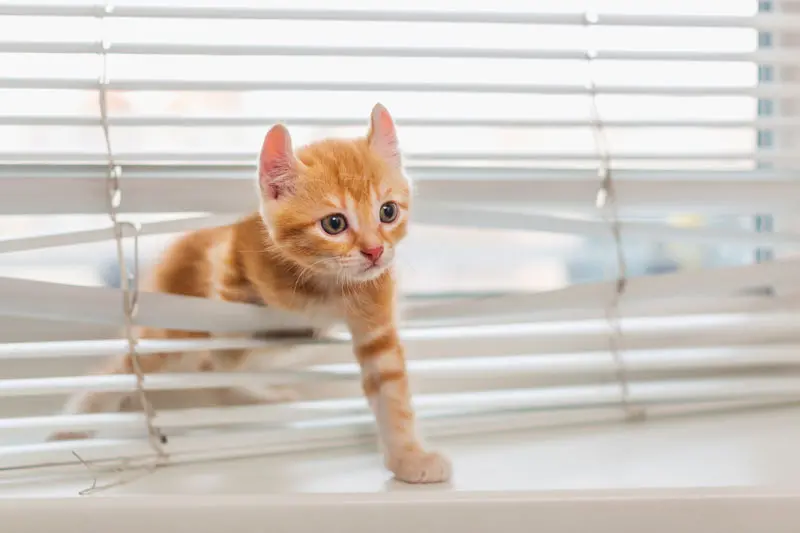How to Stop Your Cat’s Bad Behaviors
Cats and Jumping on Counters and Tables
Trying to prevent cats from jumping on counters and tables can be a difficult task. As naturally curious animals, cats will attempt to explore every bit of your home. Sometimes, this can be costly if a valuable item is knocked from a counter by your cat, but it can also be dangerous.
We have a few tips on how to safely prevent cats from jumping on counters.
Put Deterrents in Place
If you have a curious cat that likes to jump and climb, consider a deterrent. Sticking foil or baking paper on counters will make a sound when your cat lands. This will startle them, but not physically harm them. They will eventually associate the startling sound with jumping on the counter and it will deter them from jumping in the future.
Offer Alternatives in High Places
A great way to prevent cats from jumping on counters and tables is to give them something else to climb. As natural climbers, cats crave vertical challenges and will be drawn to the high locations. A cat tower will satisfy their need to climb up high. To make their own vertical space more appealing, place it near a window. As well as getting a good spot to snooze in the sun, your cat will be able to see outside. This will allow them to watch natural prey, such as birds, to entertain their natural curiosity and instincts.
Make Counters Less Tempting
Cats climb purely out of curiosity. If there’s nothing to explore, they will quickly lose interest. Make sure there’s nothing to tempt them onto counters and tables by never leaving food out. Always wiping down surfaces to remove food odors will also take away any temptation. Consider using a citrus scented cleaner – this is a natural deterrent for cats.
As well as food, make sure there is nothing else to tempt your cat to climb up high. Consider getting blinds or curtains for windows near counters so that your cat can’t see outside.
Keep Them Away From the Cooking
A cat’s sense of smell is 40 times stronger than that of a human. This means that any delicious-smelling food you’re cooking is extra appealing to your cat. The smells can excite their sense of curiosity, making them want to explore and find the source of the smell. While liking your food can be a compliment, you may not appreciate the fur and dirty paws near your meal. There is also a danger that your cat could eat something that is bad for their health or potentially burn themselves on hot pieces of food or cooking utensils. Keeping your cat in another room while you’re cooking can minimize this risk. Make sure they have somewhere to sleep and toys to keep them comfortable and stimulated. However, this may not be suitable for all cats. If your little feline scratches or whines to leave the location they are confined to, try not to leave them in there for too long to minimize stress.
Cat Scratching Furniture/Carpet
What drives your soft and sweet friend to become scratch-happy? There are several reasons your cat might be scratching.
The following behaviors fall under “normal” scratching:
Claw Maintenance
Cats scratch at objects to clean their claws and remove worn outer layers.
Marking Their Turf
Regular scratching at the same location is a way for a cat to mark and maintain their territory.
A Form of Exercise
Hooking into a surface and pulling backward is a way for cats to stretch their bodies.
Entertainment
Your cat isn’t intentionally targeting your sofa corner or hands. Scratching is an enjoyable way for them to burn off some energy.
Stress
Cats tend to scratch more — and vertically — when they’re feeling threatened or stressed. You might see scratch marks up and down a door jamb, window frame, sofa, or chair. This means your cat is nervous or unhappy and trying to increase their comfort level. This isn’t good for your cat, or your home.
How to Stop Cats from Scratching:
While scratching is as natural for cats as meowing, there are strategies to help reduce vertical scratching that will keep your couch corners safe from harm:
Cat Scratching Post
One of the best ways to keep your cat from scratching everything in sight is to provide them with a scratching post or kitty condo. Placing the post near your cat’s bed is a great idea, because cats love a good stretch when they first wake up, and a scratching post can provide both a stretch and some scratching for your kitty. Most cats will make multiple daily visits to their scratching posts.
Deter Their Desire
Use deterrents, such as foil or double-sided tape, to cover up sought-after places for your kitty’s claws. Teach your cat while gradually reducing vertical scratching by standing guard with a squirt bottle of water and giving them a light spray each time the claws come out.
Exercise/Active Time
Divert attention from fabrics by giving your cat a furry friend in the form of a toy. Cat behavior issues won’t have time to take place if they are in hot pursuit of a fuzzy mouse.
House Soiling
House soiling, or inappropriate urination or defecation, is a common problem in cats. While in many cases the cause is a behavioral problem, sometimes medical issues are to blame. If your cat eliminates outside the litter box, they should be checked by a veterinarian for an underlying medical condition before it’s determined that the inappropriate elimination is due to a behavior problem. In addition to a complete physical examination, your cat should have a complete blood count, blood chemistry panel and urinalysis. Other tests, such as radiographs that use special dyes to outline the urinary tract, may be necessary as well. If an underlying condition is determined to be the cause of your cat’s house soiling, the medical problem should be treated, and your pet’s response to treatment should be closely monitored.
These common litter box problems could be repelling your cat:
- An unclean litter box
- Too few litter boxes for the cats in the household
- A cramped litter box
- A litter box with a hood or liner
- A litter box with sides that are high
- Too much litter in the box
- An uncomfortable location that doesn’t allow for privacy and multiple escape routes
- A change in the kind of litter your use
- Negative associations. Your cat may have been upset while using the box. She may also connect the box with painful elimination, even if their health is back to normal
- Stressors like moving, adding new animals or family members to the household
- A conflict with another cat in the household
- A new preference for eliminating on certain surfaces or textures like carpet, potting soil, or bedding
Share This Post
Recent Posts
About Shallowford Animal Hospital
Shallowford Animal Hospital and The Pet Spa at Shallowford are dedicated to the exceptional, compassionate care your pet deserves. Pets hold a very special place in our families, and we treat yours like our own.




